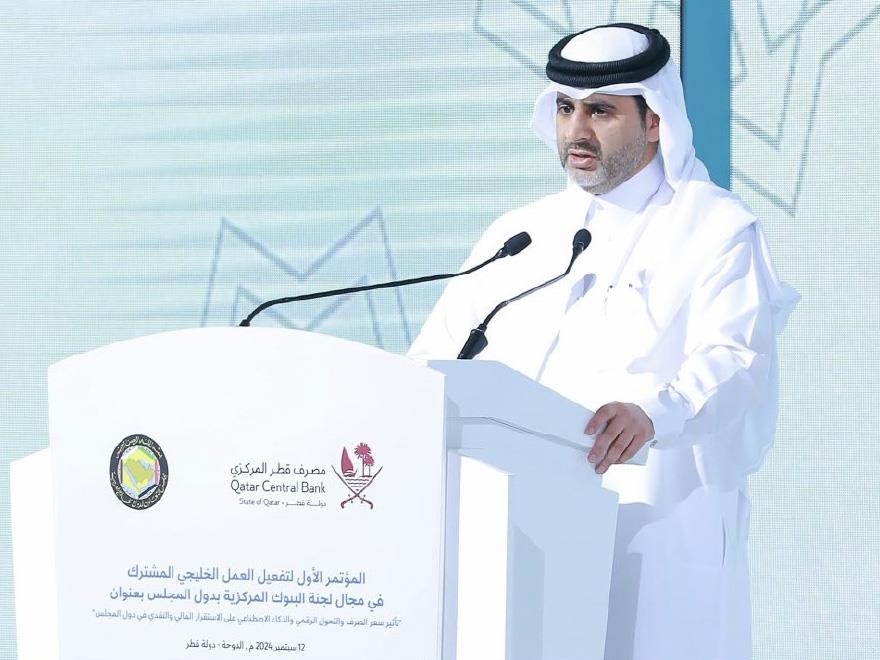
'GCC Countries Maintained Financial And Monetary Stability In The Region'
Doha, Qatar: The Gulf Cooperation Council (GCC) countries have maintained financial and monetary stability in the region, said Governor of Qatar Central Bank (QCB) H E Sheikh Bandar bin Mohammed bin Saoud Al Thani.
Speaking during his participation in the first discussion session of Their Excellencies the GCC Central Bank Governors under the title 'The impact of exchange rate policy on financial and monetary stability in the GCC Countries', he noted that the fixed exchange rate policy is the most successful one for the GCC countries.
At the beginning of the session during the first edition of the first annual conference on enhancing joint Gulf cooperation within the GCC Central Banks Governors Committee, hosted by the State of Qatar, His Excellency added that each country has a specific policy regarding its national currency as it forms the basis of the economy of each country, so each country has its own economic nature that determines the adopted exchange policy, noting that most GCC countries adopted a fixed exchange rate policy that has proven successful, which is reflected in the benefits achieved, and it has led to financial and monetary stability.
Adopting this policy, he noted, attracted foreign capital, preserved domestic capital, mitigated fluctuations in the prices of imported materials and in inflation, and reduced the cost of major projects. Considering the many benefits achieved thanks to the current exchange rate policy and comparing them with the challenges represented by the lack of independence of monetary policy, the benefits are much greater than the challenges that can be faced, the QCB Governor stressed, adding that the economies of the region need to impart knowledge regarding construction and technology, and all of these matters require policies that contribute to enhancing financial and monetary stability and attracting capital to the countries of the region. The current exchange rate policy has contributed to attracting investments and achieving economic diversification, and fixing the exchange rate has limited currency fluctuations and the associated risks, he said.
Adopting a specific exchange rate policy comes after an in-depth study of the economic structure of countries and infrastructure along with an assessment of the benefits that this policy will reap,he explained. Therefore, after reviewing all this data, it became clear that the fixed exchange rate policy is the most successful one for the Gulf countries, he said, stressing that adopting another exchange rate policy requires a change in the economic structure which takes years and decades and does not happen overnight, noting the International Monetary Fund's praise for the success of the current exchange rate policy.
Sheikh Bandar bin Mohammed bin Saoud Al Thani also touched on the GCC countries' success in maintaining a moderate inflation, and that the countries of the world witnessed, over the past two years, an increase in inflation rates, reaching 9 and 10 percent, while in the GCC countries they were around 5 and 6 percent.
Governor of the Saudi Central Bank H E Ayman Al-Sayari said monetary policy is one of the important economic policies that aim to maintain monetary stability and its target depends on the economic structure and its characteristics.
He explained that energy exports and their derivatives represent approximately 70 percent of the commodity exports of the GCC countries as these goods are priced in addition to imports in US dollars, noting that statistics indicate that the majority of transactions in global trade are settled in US dollars and that is why fixing the exchange rate contributes to reducing currency fluctuations and thus reducing imported inflationary pressures.
In turn, Executive President of the Central Bank of Oman H E Tahir Salim Al Amri said that exchange rates vary, with pegging to a specific currency being for purely economic reasons, noting the GCC economies diverse gains.
He praised the regions economies describing them as being among the largest and most significant in the global economy, which necessitates finding an appropriate exchange rate to achieve the goals and objectives of the regions countries.
In turn, Governor of Central Bank of Bahrain H E Khalid Ebrahim Humaidan said that fixing the exchange rate has many benefits, the most prominent of which is achieving higher growth rates and recording lower inflation rates, along with attracting and drawing greater investments.
His Excellency added that over the past forty years, the GCC countries have recorded high growth rates compared to the rest of the world, with the Gulf economy growing at a faster pace by approximately 15 percent compared to other countries.
The Governor of Central Bank of Bahrain added that the average inflation rate in the region is around 2 percent, whereas the global average stands at 5.1 percent.
He pointed out that the region has attracted high levels of direct foreign investment, with an annual growth rate of 5.5 percent in foreign investments, compared to a 3.1 percent growth rate in other parts of the world.

Legal Disclaimer:
MENAFN provides the
information “as is” without warranty of any kind. We do not accept
any responsibility or liability for the accuracy, content, images,
videos, licenses, completeness, legality, or reliability of the information
contained in this article. If you have any complaints or copyright
issues related to this article, kindly contact the provider above.


















Comments
No comment